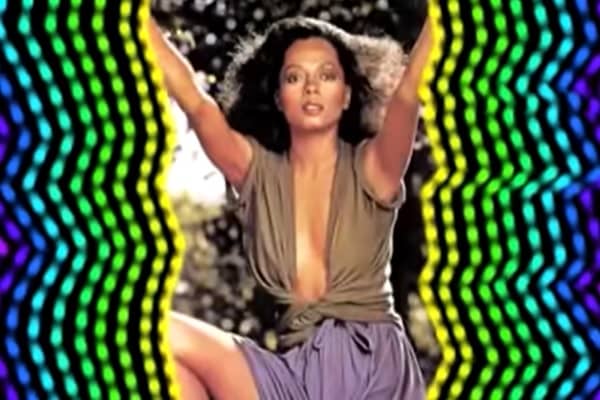You probably know Diana Ross as the legendary Queen of Motown. With her glittering gowns, towering hairdos, and show-stopping vocals, she rose to fame as the lead singer of The Supremes in the 1960s before launching an equally dazzling solo career.
Hits like “Ain’t No Mountain High Enough,” “Upside Down,” and “I’m Coming Out” cemented her status as a pop icon. ButRoss’s music also struck a deep chord with the gay community, making her one of the most beloved gay icons of all time.
This connection was cemented in 1980 when Ross released the disco-pop smash “I’m Coming Out,” which became a gay pride anthem overnight despite Ross not even realizing its meaning initially.
So is Diana Ross gay herself? While she’s never publicly stated her sexual orientation, Ross has fully embraced her status as a gay icon.
However, the mystery around her own sexuality has persisted for decades. Let’s take a closer look at the enduring bond between Ross and the LGBTQ community.
The Creation of an Anthem
In 1980, Ross was seeking to reinvent herself in the post-disco era. She collaborated with the production duo Nile Rodgers and Bernard Edwards of the group Chic.
While brainstorming song ideas, Rodgers found inspiration after visiting a New York City transgender club and seeing Diana Ross impersonators performing.
Rodgers recalled, “All of a sudden a lightbulb goes off in my head. I had to go outside and call Bernard from a telephone booth. I said, ‘Bernard, please write down the words: I’m coming out.'”
When Ross first heard the song, she immediately connected with its bold, empowering lyrics about breaking out of one’s shell. But she didn’t initially grasp that it was about coming out of the closet as gay.
As Rodgers told it, “She didn’t understand that that was a gay thing – that that was a person saying, ‘I’m coming out of the closet.’ She didn’t even get that.”
“I’m Coming Out” Becomes a Hit

The anthemic song appeared on Ross’ 1980 album “Diana,” which became the best-selling release of her career. Upon its release, the gay community instantly embraced “I’m Coming Out” as a coming out anthem.
Ross’ close friend, prominent NYC radio DJ Frankie Crocker, recognized the song’s gay meaning and gave it significant airplay.
The irresistible dance floor filler topped the charts, peaking at #5 on the Billboard Hot 100.
With its driving bassline and Ross’ belting vocals declaring freedom and self-love, “I’m Coming Out” took on a life of its own. It cemented Ross’ successful reinvention for a new decade.
Importance and Impact on LGBTQ Culture
Over the years, “I’m Coming Out” (paid link) became woven into the fabric of LGBTQ culture. It remains an enduring gay pride anthem often heard at Pride parades and other community events.
For many closeted gay people, both then and now, Ross’ lyrics resonate as a secret personal anthem – “There’s no hiding place / When I’m getting you in my embrace.”
Ross fully embraced becoming a gay icon because of the song’s monumental impact. In 2021, she told Entertainment Weekly, “I’m Coming Out means freedom to me.
It exploded into something so big. It became an anthem for the gay community. I embrace that.” Indeed, the song’s legacy continues as a cultural milestone for LGBTQ visibility and expression.
Ross’ Enduring Gay Icon Status
Beyond “I’m Coming Out,” Ross’ flamboyant stage presence and glamorous diva persona have appealed to LGBTQ fans for decades. While never directly addressing her own sexuality, Ross has signaled her support for the community in various ways.
Ross‘ daughter Tracee Ellis Ross coyly addressed the chatter about her mom’s sexuality, telling Andy Cohen, “She’s never said she’s gay, but I don’t think she would be bothered if people thought that.
Her Response to Speculation
So where exactly does Ross herself stand on all the speculation surrounding her sexual orientation? Well, she has chosen not to publicly discuss it one way or another.
Cultivating an aura of gender-bending mystique and ambiguity has always been part of her celebrity image and appeal.
Now in her late 70s, Ross has indicated she prefers keeping the focus on her artistic output and performance skills that have sustained her for over 60 years in show business.
Neither confirming nor denying rumors, Ross leaves fans to draw their own conclusions about who she truly is. There is a commonly held belief among devotees that she is bisexual or fluid in her sexuality. But the singer herself has no interest in labeling her sexual identity for the public.
The Impact of Her Silence
Ross’s declining to directly address the many years of speculation has allowed fans to freely project their own ideas and beliefs onto her carefully crafted public image.
Yet some have argued that Ross missed a chance to fully embrace her pioneering role in LGBTQ culture by proudly coming out herself.
However, her generation’s reluctance to discuss sexual matters openly must be considered. Ross lets the messages of self-love and freedom in songs like “I’m Coming Out” speak for themselves.
Rather than make bold declarations about her sexuality, she expresses those themes subtly through the power and artistry of her music.
Regardless of whether she publicly claims the label “gay icon,” Diana Ross’ legacy of uplifting marginalized groups with messages of pride and self-acceptance will live on.
While the mystery endures about her sexuality, the impact of anthems like “I’m Coming Out” extends far beyond this one singular artist.
The song remains a triumphant symbol of freedom for the LGBTQ community and marginalized people everywhere. Her glittering career speaks for itself.
Final Words
Over six decades into her career, there’s no denying Diana Ross’ eternal status as a gay icon. She may prefer enigma to proclamations when it comes to her sexuality and identity as a woman.
But the Queen of Motown’s music forever touched millions of LGBTQ lives by echoing their own journeys towards fearless self-expression.
About the Author
Team Guitar Top Review Talk about Guitars! We are a group of friends that bonded over their shared love of playing guitar. We all have different backgrounds and experiences with music, but we share a passion for writing about the things that we love.


